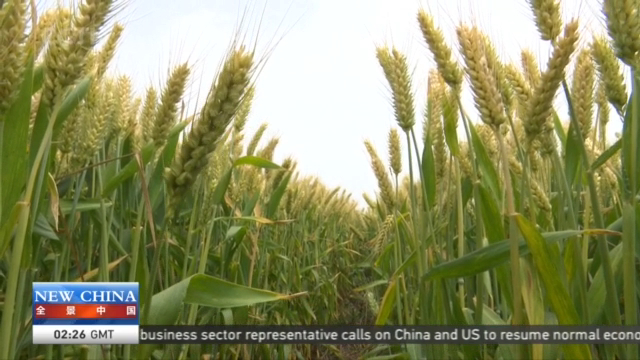
12:28, 13-Sep-2019
China's Efforts in Food Security: Scientists focus increasing wheat production
Updated
13:59, 13-Sep-2019

In many parts of China, wheat is a food staple. A lot of time and research goes into increasing its production and resistance to disease. Recently, a research team in China's Shaanxi province unveiled its latest study on wheat. CGTN's Zheng Yibing has more on what it's doing.
A familiar staple crop to many: wheat. It's used to make a variety of dishes in Chinese cuisine. But few know that its genetic makeup is far more complicated than rice and even human DNA. For some scientists, they say sequencing the wheat genome is like climbing Mount Qomolangma (or Mount Everest.)
International researchers are working on ways to increase its yield and nutrition. The genetic code of wheat was finally unlocked a year ago after more than a decade of research. Chinese scientists were part of the collaboration.
SONG WEINING, PROFESSOR NORTHWEST AGRICULTURE & FORESTRY UNIVERSITY "After we decipher this codebook, we can further explore the life process of wheat from the molecular level to analyze its growth and its reproduction. This is based on our basic theoretical studies."
For Song and his peers, a growing population, the loss of farmland and climate change are posing threats to food security not only for China but other countries.
ZHENG YIBING YANGLING, SHAANXI PROVINCE "So, next, their priority is to find higher-yielding varieties that adapt to diverse environments. For this part, they are always ready to make new efforts."
Zhang Zhengmao has been breeding wheat for more than 30 years.
ZHANG ZHENGMAO, PROFESSOR NORTHWEST AGRICULTURE & FORESTRY UNIVERSITY "With the genetic information, we will use the strategy of molecular design in wheat breeding, to meet our needs. In that case, we will have breakthroughs to have better nutrition, resistance and quality of wheat."
Experts say on-going research to develop new strains is getting results.
WANG ZHENGBING, PROFESSOR NORTHWEST AGRICULTURE & FORESTRY UNIVERSITY "In the past seven decades, the wheat crop in China has updated seven times, and each time marks an evidently higher yield."
China is the world's largest wheat producer and consumer, but concerns remain.
WANG ZHENGBING, PROFESSOR NORTHWEST AGRICULTURE & FORESTRY UNIVERSITY "When it comes to quality, there is still a huge space for improvement. We need to keep on working on this."
Researchers say having a variety of wheat strains is key to understanding how genes evolve and what can help to resist drought and pests. It's especially important for a country like China - home to about 20 percent of the world's population. Zheng Yibing, CGTN, Yangling, Shaanxi Province.
SITEMAP
Copyright © 2018 CGTN. Beijing ICP prepared NO.16065310-3
Copyright © 2018 CGTN. Beijing ICP prepared NO.16065310-3